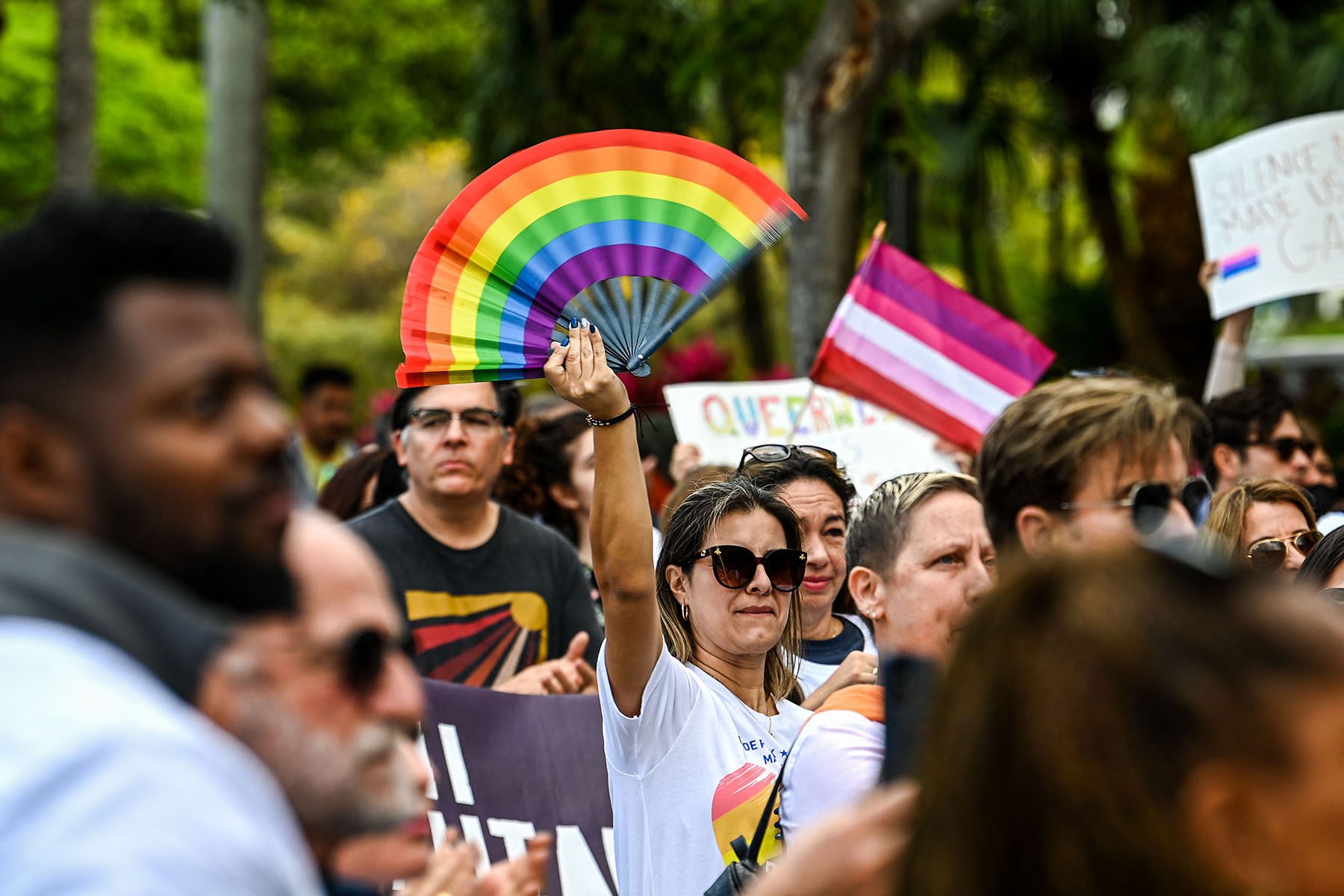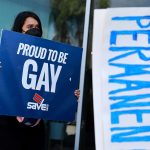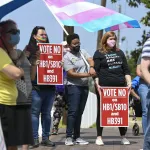Earlier this month, Alabama Gov. Kay Ivey signed into law House Bill 322, colloquially dubbed the “Don’t Say Gay” bill, restricting public school teachers from discussing LGBTQ+ history or people in public elementary schools.
It stood out for two reasons: Alabama was just the second state to pass such a law in 21 years, after Florida passed a similar measure in March. But more significantly, Ivey had just signed a repeal of a similar law the previous year.
At least 20 states have introduced “Don’t Say Gay” laws this year, which have made waves around the country. But in a handful of states, versions of the legislation have existed for decades.
Since 1992, Alabama’s education code stipulated that teachers emphasize “in a factual manner and from a public health perspective, that homosexuality is not a lifestyle acceptable to the general public and that homosexual conduct is a criminal offense under the laws of the state.”
Ivey did not issue public statements when she signed the repeal, which was first passed by the legislature, but her signature seemed in step with the times. A year ago, “Don’t Say Gay” laws that had passed in the 1980s were considered archaic, LGBTQ+ advocates said, with many of them repealed over the years. After marriage equality became the law of the land in 2015, seven states passed laws mandating that curriculums include LGBTQ+ history and life.
Republican lawmakers say the new spate of curriculum bills allow parents to decide what their children learn about sexuality at a young age; Florida’s new law bars discussions of sexual orientation or gender identity until after third grade, at which point parents must be notified if their kids might learn about LGBTQ+ issues. But this year, as 15 states now have anti-trans sports bans on the books, LGBTQ+ advocates say Republican lawmakers are aiming to one-up each other for political gain.
“Republicans have to put a conservative point on the board, notch their anti-LGBT credentials, and say, ‘Look, I really campaigned on this.’ Or, ‘I really went to the mat for this anti-LGBT policy,’” said Adam Polaski, communications director for the Campaign for Southern Equality. “Unfortunately, opponents of LGBT equality have often taken their fight to the schools.”
Texas lawmakers have expressed interest in pursuing a “Don’t Say Gay” bill like Florida’s and Alabama’s, even though the state has had a similar regulation on the books since 1991. In Texas, the state code still stipulates that educational materials for people under the age of 18 “state that homosexual conduct is not an acceptable lifestyle and is a criminal offense.”
According to the Movement Advancement Project (MAP), which tracks LGBTQ+ policy throughout the country, 19 percent of the country lives in a state with an LGBTQ+ curriculum ban. Most are in states with laws that predate Florida’s and Alabama’s. Still, most Americans are largely unaware of the fact that Florida is not the first state to pass such a law, advocates said.
Oklahoma passed the nation’s first bill banning teachers from talking about homosexuality in an AIDS sex ed measure in April 1987, and Louisana followed suit that July. South Carolina passed a “Don’t Say Gay” bill in 1988. Texas and Arizona passed their own in 1991. In total, nine states passed laws banning schools from teaching about “homosexuality” from 1987 to 2001, when Utah adopted its version.
Many of those were written into sex ed codes. For example, Louisiana still has a law on the books that states, “No sex education course offered in the public schools of the state shall utilize any sexually explicit materials depicting male or female homosexual activity.”

However, that is not the case in every state, said Logan Casey, senior policy researcher and adviser for the MAP.
“Many of these laws are written intentionally vaguely so that they can be applied even more broadly than the explicit letter of the law might suggest,” Casey said of the laws written up until 2001.
Mississippi sex ed law requires that teachers simply teach current state law related to sexual conduct and lists “homosexuality” alongside sensitive topics such as “forcible rape, statutory rape, paternity establishment” and “child support.” Mississippi state law does not protect LGBTQ+ people from discrimination.
Casey said the bills are relics of the AIDS crisis, when panic about homosexuality dictated school curriculum. It also dates back to the infamous “Save Our Children” campaign led by activist Anita Bryant in the 1970s to overturn anti-discrimination protections for LGBTQ+ people in Miami, Florida.
“Once the HIV epidemic came into the picture, then a bunch of states started considering and enacting laws that banned instruction on sexuality and homosexuality in public education, channeling this ‘Save Our Children’ campaign energy and the fear and prejudice during the HIV epidemic,” Casey said.
Five states repealed their “Don’t Say Gay” bills between 2006 and 2021, when Alabama rescinded its law.
Those familiar with the old curriculum laws expressed surprise that Florida’s latest bill has sent shockwaves across the nation. Advocates say part of that surprise is that “Don’t Say Gay” statutes have been revived after two decades. They also add that local groups have gotten smarter about fighting the measures.
Vivian Topping, director of advocacy and civic engagement of the Equality Federation, a coalition of state LGBTQ+ organizations, said local Florida organizers worked overtime to sound the alarms about their “Don’t Say Gay” bill.
“They created TV ads and really brought together national partners to make a big splash out of what was happening in Florida,” she said in a statement.
Advocates say that the current push for “Don’t Say Gay” bills is political. Nadine Smith, executive director of Equality Florida, has claimed that Florida Gov. Ron DeSantis’ decision to push the “Don’t Say Gay” bill in Florida is less about kids and more about the Republican’s presidential ambitions.
“DeSantis has damaged our state’s reputation as a welcoming and inclusive place for all families, he has made us a laughing stock and target of national derision,” Smith said in a statement. “Worse, he has made schools less safe for children.”
DeSantis has argued that his bill allows parents to decide what their kids learn.
“Parents’ rights have been increasingly under assault around the nation, but in Florida we stand up for the rights of parents and the fundamental role they play in the education of their children,” said DeSantis in a statement.







